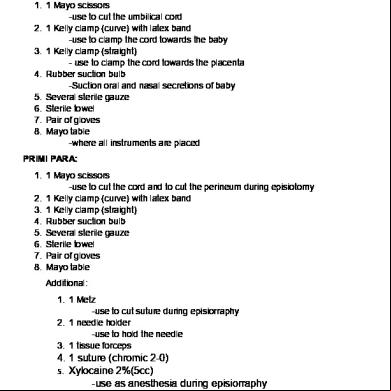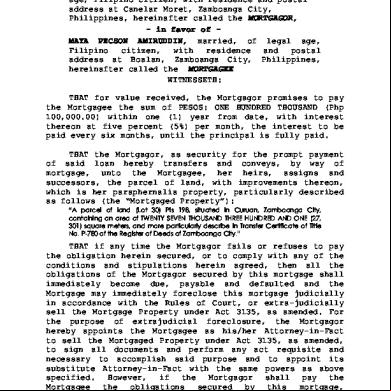14 Griffin V. California 27503t
This document was ed by and they confirmed that they have the permission to share it. If you are author or own the copyright of this book, please report to us by using this report form. Report 3b7i
Overview 3e4r5l
& View 14 Griffin V. California as PDF for free.
More details w3441
- Words: 741
- Pages: 1
[TRIAL] 14 GRIFFIN V. CALIFORNIA April 28, 1965 | Douglas, J. | Doctrine: Insert doctrine here Facts: ● ● ●
● ● ●
Griffin was convicted of murder after a jury trial in a California court. He did not testify at the trial on the issue of guilt, though he did testify at the separate trial on the issue of penalty. The trial court instructed the jury on the issue of guilt, stating that a defendant has a constitutional right not to testify. But it told the jury that if “he does not testify or if, though he does testify, he fails to deny or explain such evidence, the jury may take that failure into consideration as tending to indicate the truth of such evidence and as indicating that among the inferences that may be reasonably drawn therefrom those unfavorable to the defendant are the more probable." ○ It added however, that no such inference can be drawn as to evidence respecting which he had no knowledge. ○ It stated that failure of a defendant to deny or explain the evidence of which he had knowledge does not create a presumption of guilt, nor, by itself, warrant an inference of guilt nor relieve the prosecution of any of its burden of proof. It appears that Griffin had been seen with the deceased the evening of her death and the prosecutor claimed that Griffin would definitely have known the whereabouts of the victim and the circumstances leading to her death. The California court imposed the death penalty on Griffin. The California Supreme Court affirmed.
Issue: Whether, statute or nor, the comment rule, approved by California, violates the fifth amendment. Held: YES. It is, in substance, a rule of evidence that allows the State the privilege of tendering to the jury for its consideration the failure of the accused to testify. ● No formal offer of proof is made, as in other situations, but the prosecutor's comment and the court's acquiescence are the equivalent of an offer of evidence and its acceptance. ● Wilson v. US: . . . the act was framed with a due regard also to those who might prefer to rely upon the presumption of innocence which the law gives to everyone, and not wish to be witnesses. It is not everyone who can safely venture on the witness stand though entirely innocent of the charge against him. Excessive timidity, nervousness when facing others and attempting to explain transactions of a suspicious character and offenses charged against him will often confuse and embarrass him to such a degree as to increase, rather than remove, prejudices against him. It is not everyone, however, honest, who would therefore willingly be placed on the witness stand. ● The comment on the refusal to testify is a remnant of the "inquisitorial system of criminal justice which the Fifth Amendment outlaws. It is a penalty
●
imposed by courts for exercising a constitutional privilege. It cuts down on the privilege by making its assertion costly. ○ It is said, however, that the inference of guilt for failure to testify as to facts peculiarly within the accused's knowledge is, in any event, natural and irresistible, and that comment on the failure does not magnify that inference into a penalty for asserting a constitutional privilege. ○ What the jury may infer, given no help from the court, is one thing. What it may infer when the court solemnizes the silence of the accused into evidence against him is quite another. That the inference of guilt is not always so natural or irresistible is brought out in the People v. Modesto opinion itself: "Defendant contends that the reason a defendant refuses to testify is that his prior convictions will be introduced in evidence to impeach him, and not that he is unable to deny the accusations. It is true that the defendant might fear that his prior convictions will prejudice the jury, and therefore another possible inference can be drawn from his refusal to take the stand." Malloy v. Hogan: the same standards must determine whether an accused's silence in either a federal or state proceeding is justified. ○ The Fifth Amendment, in its direct application to the Federal Government and in its bearing on the States by reason of the Fourteenth Amendment, forbids either comment by the prosecution on the accused's silence or instructions by the court that such silence is evidence of guilt.
Dispositive Reversed.
● ● ●
Griffin was convicted of murder after a jury trial in a California court. He did not testify at the trial on the issue of guilt, though he did testify at the separate trial on the issue of penalty. The trial court instructed the jury on the issue of guilt, stating that a defendant has a constitutional right not to testify. But it told the jury that if “he does not testify or if, though he does testify, he fails to deny or explain such evidence, the jury may take that failure into consideration as tending to indicate the truth of such evidence and as indicating that among the inferences that may be reasonably drawn therefrom those unfavorable to the defendant are the more probable." ○ It added however, that no such inference can be drawn as to evidence respecting which he had no knowledge. ○ It stated that failure of a defendant to deny or explain the evidence of which he had knowledge does not create a presumption of guilt, nor, by itself, warrant an inference of guilt nor relieve the prosecution of any of its burden of proof. It appears that Griffin had been seen with the deceased the evening of her death and the prosecutor claimed that Griffin would definitely have known the whereabouts of the victim and the circumstances leading to her death. The California court imposed the death penalty on Griffin. The California Supreme Court affirmed.
Issue: Whether, statute or nor, the comment rule, approved by California, violates the fifth amendment. Held: YES. It is, in substance, a rule of evidence that allows the State the privilege of tendering to the jury for its consideration the failure of the accused to testify. ● No formal offer of proof is made, as in other situations, but the prosecutor's comment and the court's acquiescence are the equivalent of an offer of evidence and its acceptance. ● Wilson v. US: . . . the act was framed with a due regard also to those who might prefer to rely upon the presumption of innocence which the law gives to everyone, and not wish to be witnesses. It is not everyone who can safely venture on the witness stand though entirely innocent of the charge against him. Excessive timidity, nervousness when facing others and attempting to explain transactions of a suspicious character and offenses charged against him will often confuse and embarrass him to such a degree as to increase, rather than remove, prejudices against him. It is not everyone, however, honest, who would therefore willingly be placed on the witness stand. ● The comment on the refusal to testify is a remnant of the "inquisitorial system of criminal justice which the Fifth Amendment outlaws. It is a penalty
●
imposed by courts for exercising a constitutional privilege. It cuts down on the privilege by making its assertion costly. ○ It is said, however, that the inference of guilt for failure to testify as to facts peculiarly within the accused's knowledge is, in any event, natural and irresistible, and that comment on the failure does not magnify that inference into a penalty for asserting a constitutional privilege. ○ What the jury may infer, given no help from the court, is one thing. What it may infer when the court solemnizes the silence of the accused into evidence against him is quite another. That the inference of guilt is not always so natural or irresistible is brought out in the People v. Modesto opinion itself: "Defendant contends that the reason a defendant refuses to testify is that his prior convictions will be introduced in evidence to impeach him, and not that he is unable to deny the accusations. It is true that the defendant might fear that his prior convictions will prejudice the jury, and therefore another possible inference can be drawn from his refusal to take the stand." Malloy v. Hogan: the same standards must determine whether an accused's silence in either a federal or state proceeding is justified. ○ The Fifth Amendment, in its direct application to the Federal Government and in its bearing on the States by reason of the Fourteenth Amendment, forbids either comment by the prosecution on the accused's silence or instructions by the court that such silence is evidence of guilt.
Dispositive Reversed.










